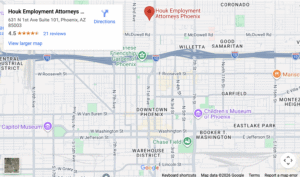
In Arizona, a per diem employee is someone hired to work on an as-needed basis, typically without a set schedule or guaranteed hours. These employees are paid only for the days they work and may be called in to cover shifts, fill temporary staffing gaps, or provide specialized support.
Despite the flexible nature of their roles, per diem employees are considered regular employees—not independent contractors—and are entitled to important legal protections under both Arizona and federal law, including minimum wage, overtime pay, and workplace rights.
Understanding these rules helps ensure fair treatment for both workers and employers.
How Arizona Law Classifies Per Diem Employees
The term “per diem” means “per day,” and in employment terms, it refers to a worker who fills in as needed rather than working a regular, ongoing schedule. These employees are common in healthcare, education, construction, and seasonal industries.
Unlike independent contractors, per diem employees:
- Are paid W-2 wages with payroll tax withholding
- Receive employer-provided training and supervision
- Must follow the employer’s work methods and policies
Because employers control key aspects of the work, per diem workers are classified as employees under the law and must be treated accordingly.
Wages and Overtime for Per Diem Employees in Arizona
Arizona’s minimum wage laws apply to all employees, including those working per diem. As of 2025, the state’s minimum wage is $14.70 per hour, with an increase to $15.15 per hour set for January 1, 2026. Some cities may have higher local minimum wage requirements that also apply.
If a per diem employee works more than 40 hours in a week, they must receive overtime pay at 1.5 times their regular hourly rate, as required by both the Fair Labor Standards Act (FLSA) and Arizona law.
Importantly, being paid per day does not exempt an employer from wage and hour rules. Per diem pay must still meet or exceed the required hourly wage thresholds, including for any applicable overtime.
Understanding Per Diem Travel Reimbursements
The term “per diem” is also used in a different context—travel reimbursements. Some employers offer per diem allowances to cover meals, lodging, and incidental expenses when employees travel for work.
In Arizona:
- Employers are not legally required to provide per diem reimbursements
- If they do, the reimbursement should comply with IRS rules to remain non-taxable
- Most companies follow the GSA (General Services Administration) per diem rates as a guideline
It’s important to note that per diem travel reimbursements are separate from wages. Employees must still be paid for their hours worked, including overtime, even when they receive a per diem travel allowance.
Key Considerations for Employers and Per Diem Workers in Arizona
Because of the flexible nature of per diem employment, clear documentation is essential. Employers should carefully track:
- Work schedules and hours
- Wage rates and overtime calculations
- Any per diem travel reimbursements
Misclassifying a per diem employee as an independent contractor can lead to legal penalties, tax issues, and wage violations. Employers must also comply with any local wage ordinances that exceed state minimum standards.
Pros and Cons of Per Diem Employment in Phoenix, AZ
Per diem work offers flexibility—but not stability. Here are some common pros and cons that workers and employers should consider when evaluating this type of arrangement:
Pros of per diem work include:
- Higher hourly pay in some industries
- Freedom to accept or decline shifts
- Variety in work environments and roles
Cons of per diem arrangements include:
- No guarantee of regular work
- Often excluded from benefits like health insurance or paid leave
- Less job security than full- or part-time roles
To avoid misunderstandings, both parties should use a clear employment agreement outlining expectations, compensation, and work terms.
Get Help From an Employment Lawyer
Per diem employment offers valuable flexibility for both Arizona workers and employers, but it also comes with unique legal and financial considerations. These employees are entitled to full wage protections, and proper classification is essential to avoid compliance issues.
Whether you’re managing a per diem workforce or working in one yourself, clearly defining expectations, pay structure, and legal obligations can help prevent costly disputes.
If you’re having an issue with your employer, Houk Employment Attorneys is here to help. Contact us today for an initial consultation with a Phoenix employment attorney.
Our employment law firm is conveniently located near you, with an office in Phoenix, AZ.
Houk Employment Attorneys
631 N 1st Ave Suite 101, Phoenix, AZ 85003
(480) 569-2377


